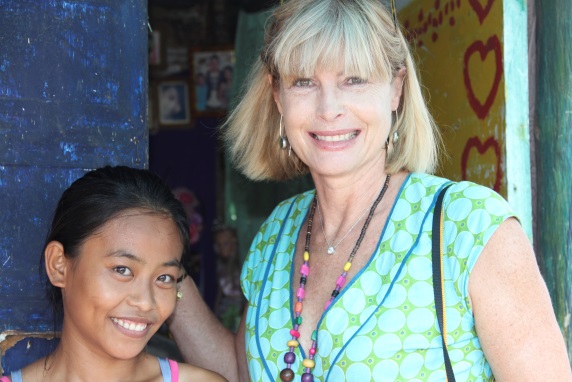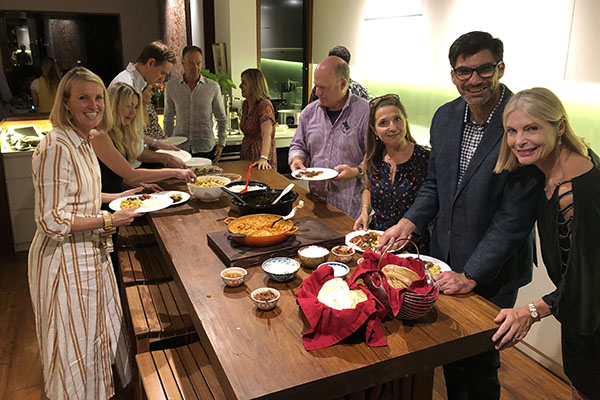Giving a 'Can Too' attitude to Opportunity

Walking through Annie Crawford and Simon Buckingham’s garden, one is immediately hit by the scent of ocean breeze mixed with the complex aroma of Indian spices. Their home brings together the outside and inside in perfect harmony and, like Annie and Simon, is both generous and authentic, beautiful and warm, and open and inviting to others.
Annie is the founder of Can Too Foundation, an independent health promotion charity committed to funding cancer research. Can Too provide coached training programs to aid people in their fitness goals and, in turn, participants fundraise much-needed support for cancer research.
But Annie and Simon’s generosity extends well beyond Can Too. The couple has partnered with Opportunity International Australia for the past 13 years and Annie is also a passionate member of Opportunity’s Council – a small group of respected and influential Australians that bring additional knowledge and experience to the organisation and who encourage others to get involved.
Each year, Annie and Simon open their home and host a delicious curry dinner for Opportunity’s national fundraiser ‘Great Australian Curry’, a meal that Simon lovingly prepares for their friends – hence the smell. Both Simon and Annie use the dinner to share more about Opportunity’s work and raise valuable funds for Opportunity’s work overseas.
Opportunity International Australia’s Chief Philanthropy Officer, Veronika Peters, sat down with Annie to talk about philanthropy and the role it has played in Annie’s life.
Q: WHO FIRST INSPIRED YOU IN YOUR GIVING GROWING UP?
A: My father was always a generous person. Whenever there were emergencies, he would always step up. My mum taught me a generosity of spirit – she was a giving person herself with her time and resources. My mother had seven children, yet she still offered a Malaysian student to stay with us for a year. She also minded the child of a friend of hers who was a single mum, every Saturday for 13 years. Whenever anyone needed help, she was the first person to be there. We are a close-knit family who still speak every week. Generosity is key for us all.
Q: LOOKING BACK OVER YOUR CAREER AND LIFE THUS FAR, WHAT HAVE BEEN THE HIGHLIGHTS?
A: That’s difficult to answer. Maybe two things: getting a job as a sexual assault counsellor – because I could really make a difference to someone 24 hours after a serious trauma. Secondly, the legacy of Can Too – seeing the ‘ownership’ from board, from team, from employees, community – I am now no longer leading the foundation, but am a very proud founder.
Q: WHAT HAS BEEN THE HARDEST LIFE LESSON YOU’VE LEARNED IN BUSINESS AND HOW DID IT SHAPE YOU AS A PERSON?
A: Learning that in order to be successful you have to be prepared to embrace discomfort, push personal boundaries, overcome the inner critic, move through fear, and become more confident in who you are. Success won’t come unless you are prepared to embrace the discomfort.
"It’s all about the human connection."

Annie (far right) hosts a curry dinner for Opportunity’s national fundraiser ‘Great Australian Curry’.
Q: WHAT ROLE HAS PHILANTHROPY PLAYED IN YOUR LIFE, MARRIAGE, AND FAMILY?
A: Philanthropy has given us a whole new dimension to life and deepened my relationship with Simon and my children as well. The benefits we have received by engaging with different organisations such as Can Too and Opportunity are far beyond what we have given – we have seen a new dimension regarding how the world works and have all grown personally – there is meaning and purpose when we are willing to engage on a personal level.
It’s all about the human connection. Going to the field is powerful because you can see individual stories come alive and truly see humanity. People are people, and when you see your contribution in action, it teaches you to value humans more in their individual context. It puts you in touch with your own humanity as you tackle the big existential ‘why’ questions.
“The joy you get from giving is far more than what the money is worth.”
Q: WHAT DO YOU SEE AS A KEY TRANSITIONAL POINT FOR PEOPLE MOVING FROM SUCCESS TO SIGNIFICANCE?
A: It is about levels of giving. When you experience financial success, then giving to your capacity can be a great privilege. The joy you get from giving is far more than what the money is worth. I wish everyone would be able to experience the satisfaction of giving no matter what the giving level.
I feel connected to the bigger issues in the world like the global refugee crisis – giving brings such a large dimension to our lives. We get insights from the organisations we support, we read up on literature, we involve our children. One of the reasons we set up the PAF (private ancillary fund) was to get the kids involved 10 years ago. We gave the children room to each nominate 2–3 charities and we asked them to do their own research, they came with us to Africa, they did work in India.
Q: WAS THERE A SPECIFIC POINT THAT TOOK YOU FROM SUCCESS TO SIGNIFICANCE IN YOUR LIFE?
A: I was a social worker for the first part of my life. When we lived in the USA, I worked in HR, then our Bio Tech company became successful and this allowed us to do something to give back. That’s when I started Can Too, when we came back to Australia.
Initially I thought if I could help 25 people train to run a marathon and they could collectively raise $50K that would be great.
People have always been my primary concern – so I wanted to create a culture where they could achieve or stretch their goals. Today, Can Too Foundation has raised $23 million, we are raising $2–2.5 million a year, and 1500–2000 people a year achieve fitness goals they never thought they could.
But my life is bigger than Can Too. For example, I enjoy partnering with Opportunity because it aligns with my passion to support women in need.
“Which fear is worse: fear of a life without purpose or fear in making that life happen?”
Q: YOU MENTIONED YOU HAD TO FACE A LOT OF FEARS – WHAT WERE YOU MOST AFRAID OF?
A: Whenever I have stood up for something, I have laid myself on the line – I have had to face the possibility of public humiliation. When I first began Can Too I had a fear that no one would even turn up to the first session. In the first few programs my friends and family supported Can Too and supported me.
When you are scared, fear can become a great motivator. I am not afraid of hard work; I would do any amount of work to make Can Too successful. I walked the streets handing out Can Too brochures. I made a lot of conscious decisions to push myself outside my comfort zone as a result of the following question: “Which fear is worse – fear of a life without purpose or fear in making that life happen?”
I also had an incredible paralysing fear of public speaking. It was debilitating. I had to move through this to be the leader I wanted to be.
Q: WHY DID YOU CHOOSE TO PARTNER WITH OPPORTUNITY INTERNATIONAL AUSTRALIA?
A: A friend of mine told me about Opportunity and I went to a breakfast and loved the organisation. I have always supported women and thought that Opportunity was an incredible way to do so. I was also keen to go to India again and meet the clients. It is such a vibrant chaotic country with so many social issues.
We have a welfare state here in Australia with a safety net, so I thought Simon and I needed to consider looking to support another organisation that was working overseas. We were already supporting an incredible charity in Africa, but I felt we could do more. I have travelled and have a global perspective – so I see the need and with this comes responsibility.
I love that Opportunity is mainly helping women. I love the idea of women working together supporting each other. I believe in the power of education. We also value the fact that Opportunity works with local partners to deliver the incredible services rather than employing Australians. The locals have the capability and the local knowledge and cultural understanding. This means that we can remove the ‘white saviours’ mentality and rather we see ourselves as investing into women’s businesses. It is a social investment that enables employment and entrepreneurial business creation which and enables the women to have dignity. There is a place for charity as well, but Opportunity has an empowering business model.
“Trust me – you will always get back more than you have given when you give to a good cause.”
Q: THE STATE OF THE ECONOMY CAN IMPACT PHILANTHROPY. HAVING SEEN HIGHS AND LOWS, WHAT ADVICE WOULD YOU GIVE PEOPLE STARTING OUT ON THEIR PHILANTHROPIC JOURNEY?
A: In the USA people are comfortable talking about philanthropy, but here in Australia it is a bit of a taboo topic which doesn’t necessarily make it easy for people starting out. I would encourage people to ask themselves if they are prepared for philanthropy to hurt. If you are starting out, give what you can and experience the joy of giving and then see if you can give more. Give where you are passionate. Get engaged in one way or the other, rather than just writing a cheque. Decide where your priorities are as family, then ask each other some tough questions such as: Do we really need a new flashier car or will our current one do? Trust me – you will always get back more than you have given when you give to a good cause.